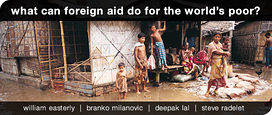I am glad that Deepak Lal has not waited in vain for a Tobin Tax discussion. I cannot speculate when and if the US congress might agree to divest itself of some of its tax-raising powers. Indeed, with the current mood in the country and the current crop of politicians sitting in the Congress, it seems unlikely. But things change… It is of course important that such a large undertaking be spear-headed by an important leader nation. So I would not exclude China or India or Brazil trying to play that role in future, if for no other reason than to show that there may be a multi-polar world after all.
No, the benefit to be distributed in cash would not need to be dropped from a helicopter (although it is not a bad idea). Rough categorical targeting is enough. Consider the real-world situation in Russia in 1992. Instead of giving aid to the corrupt neo-liberal Yeltsin regime, money could have been disbursed directly in cash to the neediest citizens—for example, to pensioners whose earnings plummeted due to inflation and the general chaos. A Global Welfare Agency could have simply used the existing infrastructure of the Russian state, pension rolls, and distributed cash grants to some 20 million Russian pensioners. Today, the same or similar approach could be applied in many countries, from Angola to Zimbabwe. Identify a group that is largely poor (large families with at least two children in school and living in area A; single mothers with at least three kids in area B; sick people in sanatoria or hospitals in area C etc.) and give them a one- or two-time cash grant of, say, $100 per person or per family. As I said yesterday, the approach is both simple and powerful. It involves three steps: raise money from the globally rich, do not deal with governments of either rich or poor nations, and transfer funds in cash to the poor.
I owe the readers the explanation of one point I raised in my first post: why do I find large-scale experiments like PROGRESA, praised by Bill Easterly, ethically troubling? The reason is that those who perform them play God. They intentionally try to find villages or communities that are as much as possibly equal in all dimensions, including how poor they are, distribute aid to one group, withhold it from another and then observe the difference in behavior. Contrast this with the approach of GWA I suggested above. Surely, many people will be excluded from the distribution of cash. But GWA at least makes an effort to determine who is most destitute and then to help them. It does not play God and INTENTIONALLY treat people who are the same differently. I know that these ideas of playing God are very popular among rich people who can, of course, write many nice dissertations precisely because the “control” group is the same in everything but the fact that it did not receive aid. But the approach is nevertheless immoral—or at least needs to be examined from an ethical standpoint (a thing which I believe no one even noticed).
A final point for Deepak Lal. I never said that migrations during Globalization I were “mainly involuntary.” I just said a “large chunk of [all migration] was involuntary.” And I would also say that the idyllic world of Globalization I ended in self-induced imperialist carnage, and that all attempts by people like Martin Wolf (and perhaps Deepak Lal; I have not read his book so I am just guessing) to explain it away fail miserably. For they have a huge problem in their lap: if this wonderful integration of capital, labor and trade worked so well, how did these nice imperialist powers end up at each other’s throat?

